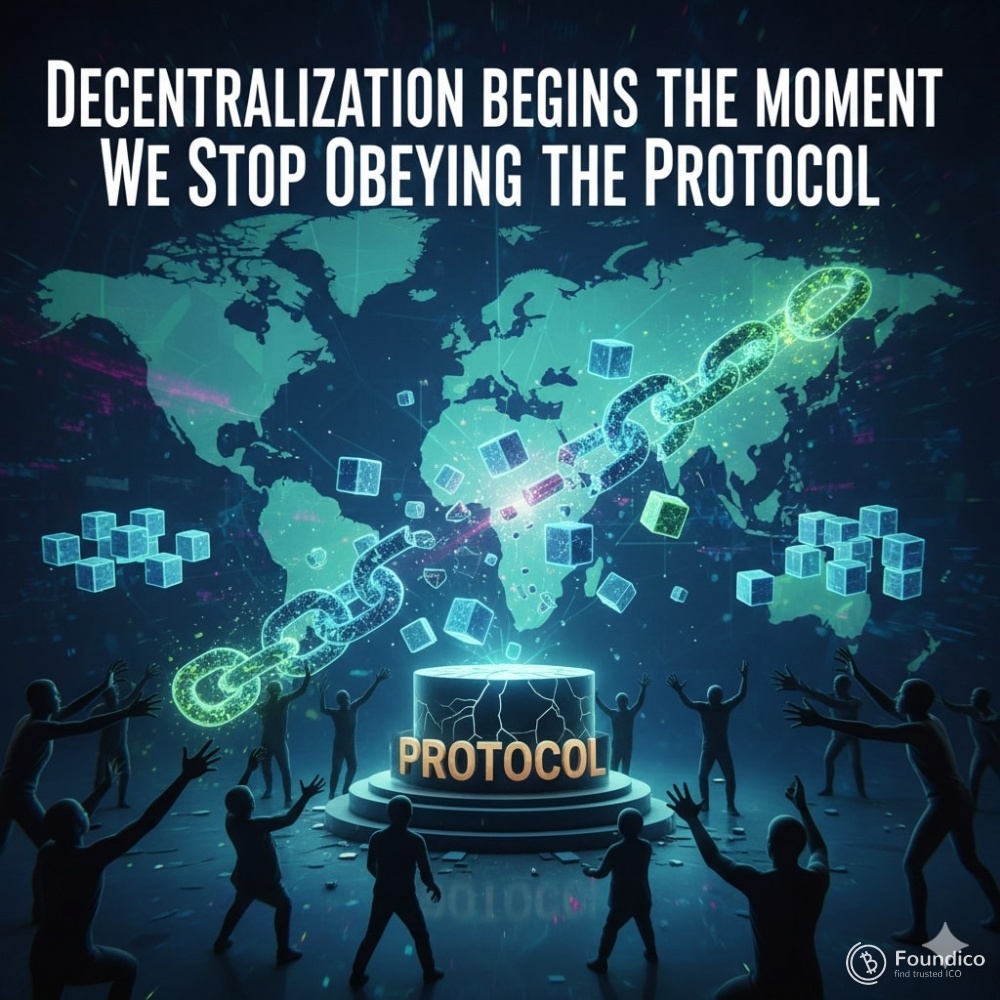Decentralization Begins the Moment We Stop Obeying the Protocol

By Dr. Pooyan Ghamari, Swiss Economist and Visionary
The heart of cryptocurrency beats with a single promise: decentralization. A world where no bank, no government, no single entity can dictate the rules of value or control. Yet, as blockchains multiply and crypto ecosystems expand, we find ourselves tethered to protocols—sets of rules crafted by developers, upheld by miners, and enforced by consensus. These protocols, meant to liberate, can become chains when blindly followed. True decentralization begins the moment we stop obeying the protocol and start questioning it.
The Protocol as a Silent Ruler
Protocols are the invisible scaffolding of crypto. Bitcoin’s code caps the supply at 21 million. Ethereum’s smart contracts govern DeFi empires. These rules feel neutral, immutable, like laws of nature. But protocols are not divine; they’re human-made, shaped by developers with agendas, biases, and visions. Every upgrade, every hard-coded parameter, reflects a choice—someone’s choice.
When you run a node, stake tokens, or trade on a DEX, you’re not just participating in a decentralized system; you’re submitting to its protocol. You trust the developers to prioritize your interests, the miners to secure the network, the validators to play fair. But what happens when a protocol upgrade raises fees, prioritizes corporate interests, or sidelines smaller players? Blind obedience to the protocol hands power to those who write the code, not those who use it.
The Myth of Passive Freedom
Crypto’s allure is the idea that a private key equals freedom. Hold your keys, control your wealth. But this is a half-truth. Your private key secures your assets, but the protocol dictates the rules of the game. If developers push an update that devalues your stake, if miners collude to censor transactions, if a governance vote skews toward whales, your key is just a ticket to a rigged match.
The myth of passive freedom keeps users compliant. We download wallets, join networks, and follow the rules, assuming decentralization happens automatically. But decentralization isn’t a gift—it’s a fight. Every time you accept a protocol update without scrutiny, you surrender a piece of your autonomy. True decentralization demands active rebellion against unthinking obedience.
The Power of Defiance
To reclaim decentralization, we must challenge the protocol itself. This doesn’t mean abandoning crypto—it means engaging with it. Run your own node to verify transactions, not just to follow the chain. Question upgrades, debate their impact, and demand transparency from developers. Platforms like X amplify these discussions, letting communities scrutinize and push back against protocol changes.
And when questioning isn’t enough, there’s a bolder step: forking. A fork—especially a hard fork—is the ultimate act of defiance. It rejects the existing protocol and creates a new one, aligned with the community’s vision. Bitcoin Cash defied Bitcoin’s scaling limits. Ethereum Classic stood firm against reversing the DAO hack. These forks weren’t just technical; they were declarations that users, not developers, can shape the future.
The Work of Decentralization
Forking is not a casual act. It demands coordination, technical skill, and a community willing to sustain a new chain. But it’s not the only path. Decentralization begins with smaller acts of resistance: running a full node, using decentralized exchanges, or supporting protocols with equitable governance. Every step away from blind obedience—every node spun up, every centralized service abandoned—chips away at the protocol’s authority.
This work is messy. Forks can fracture communities, dilute value, or fail outright. Questioning protocols invites conflict, pitting users against developers or whales. But this messiness is the point. Decentralization isn’t a state of harmony; it’s a constant struggle to distribute power. Obeying the protocol is easy; challenging it is the spark that keeps crypto alive.
A Call to Stop Obeying
Crypto was born from defiance—a middle finger to centralized finance. But that spirit fades when we treat protocols as sacred. Decentralization doesn’t live in the code; it lives in the moment we stop obeying and start acting. Question the developers. Fork the chain. Build a network that reflects your values, not theirs.
The protocol is not your master. It’s a tool, one you can reshape or replace. Decentralization begins when you stop following the rules and start writing your own. The blockchain is waiting—dare to break it.
Dr. Pooyan Ghamari is a Swiss economist and visionary, exploring the intersections of technology, finance, and human freedom.

 Maxi Doge - $MAXI is the meme-powered token of Maxi Doge—a body-building, 1000x-leverage-trading Doge who represents ultimate strength, hustle, and the grind of the bull market. He never skips leg day, a 1000x trade, and he definitely never touches grass.
Maxi Doge - $MAXI is the meme-powered token of Maxi Doge—a body-building, 1000x-leverage-trading Doge who represents ultimate strength, hustle, and the grind of the bull market. He never skips leg day, a 1000x trade, and he definitely never touches grass.